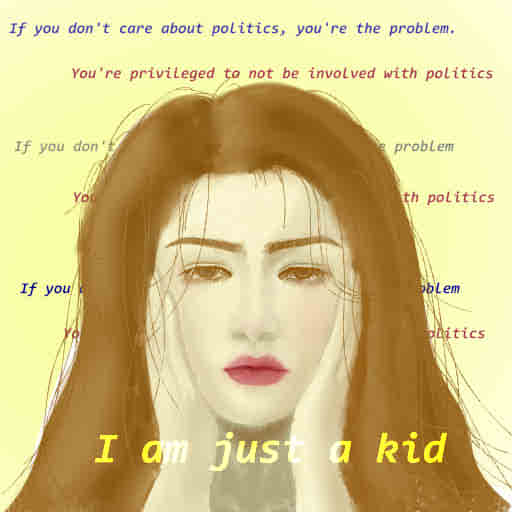Continuing the Conversation: Students shouldn’t feel pressured to be involved in politics
April 16, 2021
Dear Reader,
Over the summer, at the peak of the BLM movement, I distinctly remember one post being circulated that read something along the lines of “If you’re not into politics, then you’re privileged and part of the problem.” The aggressive nature of this tweet didn’t sit right with me, especially since I was 16 at the time. As a 16/17-year-old, I don’t know jack about anything. While that post may have been intended for an adult audience, I saw people my age reposting it on Instagram which made me feel guilty, but at the same time, where do I even begin to understand politics?
Throughout high school, I’ve spent my time learning how to do derivatives and write rhetorical analysis essays among other lessons, but none of them have taught me how to respond to current events and politics. Now that I’m actually taking a government course, I constantly find myself taken aback by how much my peers know about political issues and figures, which makes me wonder “When did everyone start knowing these things? Did I miss a step?”
Obviously, there’s the internet and tons of news outlets available that make information available with the tap of a screen, but there’s an overwhelming amount of information out there that I don’t know what I should read first. The pressure on social media to be politically active is no help at all and honestly acts as more of a detriment to its intended audience. These resourceless posts call out people without providing them ways on how to improve themselves. People shouldn’t aggressively pressure others into being a politically engaged citizen, rather that aggression should be directed to fighting the real enemy.
Oftentimes, teen activism is performative activism.
Ultimately, teens are still educating themselves so they shouldn’t be pressured to choose a side. We barely know how to help ourselves, how can we be expected to help fix America?
To clarify, teens should still remain aware of current events and have some empathy (most political issues are unfortunately humanitarian issues in disguise), but they shouldn’t have to feel like a bad person for not being vocal about their opinions.
However, youth are the future so the sooner they’re engaged the better. We’re the generation that’s going to change the world, but we need to be given time to educate ourselves rather than forced into a side. Honestly, many teens don’t even understand politics enough to develop a solid opinion. It’s ok to not take a firm, vocal stance AS LONG AS you’re educating yourself in the process. Pressuring teens to be politically active is incredibly problematic.
Until next time,
Caroline Lobel



